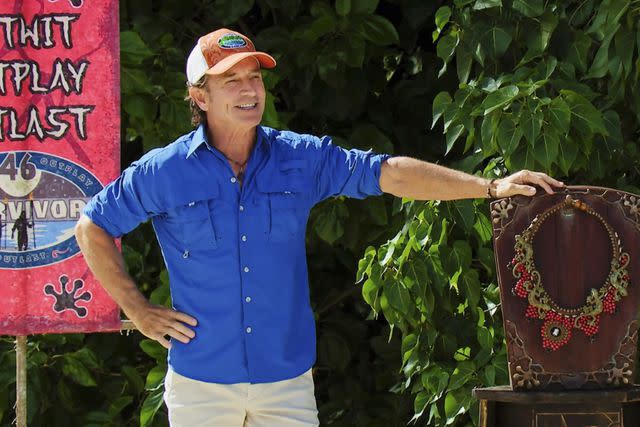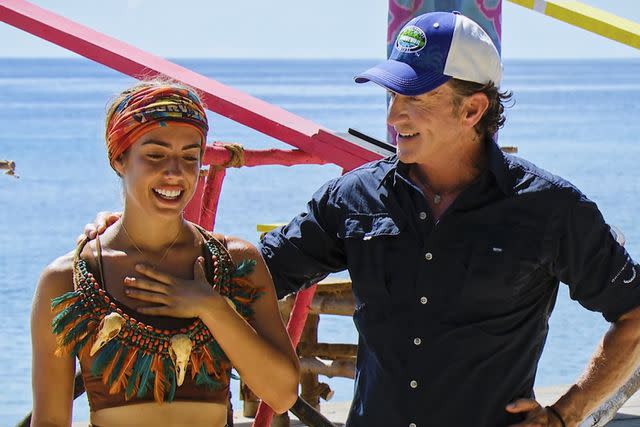Jeff Probst explains why they are sticking with 26-day “Survivor” seasons
- Oops!Something went wrong.Please try again later.
- Oops!Something went wrong.Please try again later.
"If anything, the new era — brace yourself, old time players — is more difficult," says the host.
Survivor 46 just hit the 23-day mark with this week’s penultimate episode. Which means there are only three more days to go in next week’s season finale on CBS. The number of days per season has been a controversial topic — especially among players from older seasons who endured a longer game – ever since the franchise went down from 39 days a season to only 26, beginning with Survivor 41 back in 2021. Host Jeff Probst addressed complaints about the shorter seasons on the latest episode of the On Fire with Jeff Probst podcast.
The topic came up when cohost Jay Wolff referenced some of the people this season, like Liz Wilcox and Ben Katzman, struggling physically out in the elements, leading him to ask Probst if it reinforced that 26 days is difficult enough.
“Let's just address the 39-day thing,” Probst responded on the podcast. “Because there's usually two points of contention when it comes to 39 days, and I'll address both of them.”

CBS
Jeff Probst on 'Survivor 46'Related: Survivor host Jeff Probst explains how they handle showmances
As for the first one, Probst noted that “Fans that simply don't want the game to change. They want Survivor to stay the same. I totally understand their point of view. In their mind, Survivor is 39 days…. So they think that with the exception of Covid, which I'm sure we get a pass for, that we should have and still could go back to 39 days…. The second part is the difficulty. Twenty-six days simply can't be punishing enough because it's 13 fewer days. ‘So do the math, Probst! The new era version of Survivor is clearly easier!’”
The host then addressed both complaints by explaining the decision-making involved. “How we landed at 26 days to begin with was Covid…. The requirements of starting with a 14-day quarantine and then doing two 39-day seasons back-to-back and not being able to ever leave the island for anything once we started — we just couldn't do it. So we had to get creative. We landed at 26 days.”
When they landed on that, Probst said he got pushback, and not from the fans. “There were people in my inner circle saying, ‘You are going to destroy the franchise because you won't have enough good story content if you reduce your shoot by a third.’ Meaning you need time for players like [Survivor 45 winner and On Fire cohost Dee Valladares] to have camp life and do challenges and go to Tribal and be interviewed. And there was a concern that shaving off a third would reduce too much of the time and leave you with episodes that weren't very interesting.’ We considered everyone's opinion; we felt it would still work.”

CBS
Dee Valladares and Jeff Probst on 'Survivor 45'Sign up for Entertainment Weekly's free daily newsletter to get breaking TV news, exclusive first looks, recaps, reviews, interviews with your favorite stars, and more.
Probst then addressed the second complaint, which has been especially loud from older season players. “As for the difficulty, I think it's pretty clear even just from this season, if anything, the new era — brace yourself, old time players — is more difficult.”
That sound you currently hear is pre-season 40 players screaming into the void… or their social media accounts. Why does Probst say the new, shorter seasons are tougher? “Because the physical demands of surviving with very, very little — or for some players no food — is extremely punishing and it begins to break you down mentally. You can't think, you can't sleep, you can't trust. That leads to the emotional breakdown, which can brutal.”
The host ends that section of the discussion by once again answering the query so many (including us here at Entertainment Weekly) have already asked him so many times before. “The looming question is, 'Would you ever go back to 39 days?' We'll never say never. And I mean that we're always open to where the game takes us as much as where we take the game, but for the time being, 26 days is the game. And I get it: If somebody else were sitting in this seat, they might make a very different decision. Even people on our own team, I think there's some of them that kind of wish we were at 39 days. So it's not a right or wrong, it's just, this is what we're doing.”
And will continue to do for the foreseeable future.
To hear more from the host and showrunner about the latest episode, check out On Fire with Jeff Probst.
Read the original article on Entertainment Weekly.

